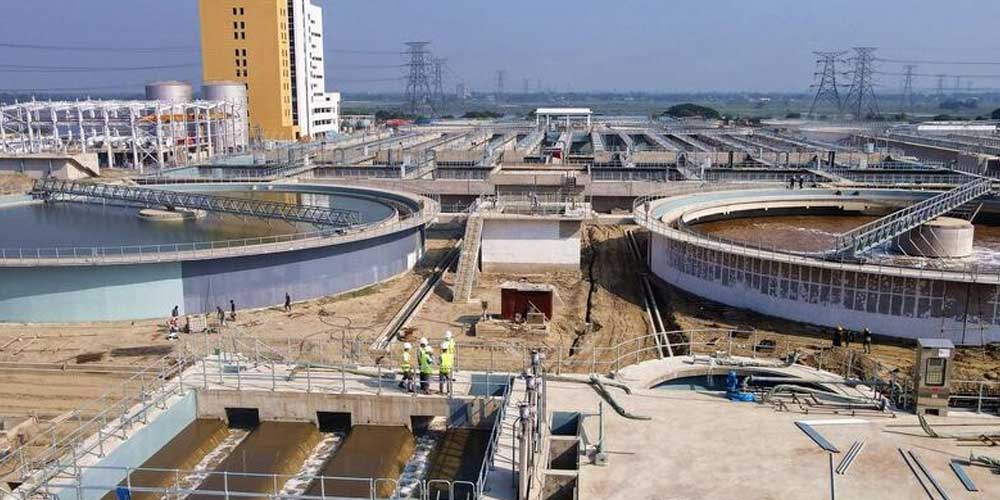פלאָקולאַנץאון קאָאַגולאַנטן שפּילן קריטישע ראָלעס אין קאַנאַליזאַציע באַהאַנדלונג פּראָצעסן, ביישטייערנדיק באַדייטנדיק צו דער באַזייַטיקונג פון סוספּענדירטע סאָלידס, אָרגאַנישע מאַטעריע און אַנדערע קאַנטאַמאַנאַנץ פון אָפּפאַל וואַסער. זייער וויכטיקייט ליגט אין זייער פיייקייט צו פֿאַרבעסערן די עפעקטיווקייט פון פֿאַרשידענע באַהאַנדלונג מעטאָדן, וואָס לעסאָף פירט צו ריינער וואַסער וואָס קען זיכער אַרויסגעלאָזט ווערן אין דער סביבה אָדער ווידער געניצט ווערן פֿאַר פֿאַרשידענע צוועקן.
קאָאַגולאַנטן באַצייכענען געוויינטלעך אַלומינום אָדער פעריק קאַמפּאַונדז, אַזאַ ווי אַלומינום סולפֿאַט, פּאָליאַלומינום קלאָריד און פּאָליפעריק סולפֿאַט. פֿלאָקולאַנטן באַצייכענען אָרגאַנישע פּאָלימערן, אַזאַ ווי פּאָליאַקרילאַמיד, פּאָלי(דיאַלילדימעטהילאַמאָניום קלאָריד), אאז"וו. זיי קענען געניצט ווערן ינדיווידזשואַלי אָדער אין קאָמבינאַציע.
פּאַרטיקל אַגלאָמעראַציע: קאַנאַליזאַציע כּולל אַ פֿאַרשיידנקייט פֿון סוספּענדירטע פּאַרטיקלען, אַרייַנגערעכנט אָרגאַנישע מאַטעריע, באַקטעריעס און אַנדערע פֿאַרפּעסטיקונגען. פֿלאָקולאַנטן און קאָאַגולאַנטן פֿאַרלייכטערן די אַגגלאַציע פֿון די פּאַרטיקלען אין גרעסערע, דיכטערע פֿלאָקן.קאָאַגולאַנץארבעטן דורך נויטראליזירן די נעגאטיווע לאדונגען אויף אויפגעהאנגענע טיילכלעך, דערמעגלעכנדיג זיי צו קומען צוזאמען און פארמירן גרעסערע קלאסטערס. פלאקולאנטן, פון דער אנדערער זייט, פארבעסערן די פארמירן פון נאך גרעסערע פלאקס דורך בריקן צווישן טיילכלעך אדער דורך זיי צו צוזאמענשטויסן און זיך האלטן איינס צום אנדערן.
פֿאַרבעסערטע זעצן: אַמאָל די פּאַרטיקלען זענען אַגלאָמערירט געוואָרן אין גרעסערע פֿלאָקן, זעצן זיי זיך גרינגער אונטערן איינפֿלוס פֿון גראַוויטאַציע אָדער אַנדערע צעשיידונג מעכאַניזמען. דער פּראָצעס, באַקאַנט ווי סעדימענטאַציע, איז אַ וויכטיקער שריט אין קאַנאַליזאַציע באַהאַנדלונג, ווײַל עס דערמעגלעכט די באַזײַטיקונג פֿון סוספּענדירטע פֿעסטע מאַטעריאַלן און אַנדערע פֿאַרפּעסטיקונגען פֿון דעם אָפּפֿאַלוואַסער. פֿלאָקולאַנטן און קאָאַגולאַנטן פֿאַרבעסערן די זעצן דורך פֿאַרגרעסערן די גרייס און געדיכטקייט פֿון די פֿלאָקן, דערמיט באַשנעלערן דעם סעדימענטאַציע פּראָצעס און פֿאַרבעסערן די קלאַרקייט פֿון דעם באַהאַנדלטן וואַסער.
פֿאַרבעסערטע פֿילטראַציע: אין עטלעכע קאַנאַליזאַציע באַהאַנדלונג פאַבריקן, ווערט פֿילטראַציע גענוצט ווי אַ דריטער באַהאַנדלונג שריט צו ווייטער אַוועקנעמען די פֿאַרבליבענע סוספּענדירטע סאָלידס און פֿאַרפּעסטיקונגען. פֿלאָקולאַנץ און קאָאַגולאַנץ העלפֿן מיט פֿילטראַציע דורך פֿאַרלייכטערן די פֿאָרמירונג פֿון גרעסערע פּאַרטיקלען וואָס זענען גרינגער צו כאַפּן און אַוועקנעמען פֿון וואַסער. דאָס רעזולטאַטן אין ריינערע אָפּפֿלוס וואַסער וואָס טרעפֿט שטרענגע קוואַליטעט סטאַנדאַרדן און קען זיכער אַרויסגעלאָזט אָדער ווידער געניצט ווערן פֿאַר פֿאַרשידענע צוועקן ווי איריגאַציע אָדער אינדוסטריעלע פּראָצעסן.
פאַרהיטונג פון פאַרפּעסטיקונג: אין באַהאַנדלונג פּראָצעסן ווי מעמבראַן פילטראַציע און פאַרקערט אָסמאָסיס, קען פאַרפּעסטיקונג געפֿירט דורך די אַקיומיאַליישאַן פון סוספּענדעד סאָלידס אויף די פילטראַציע מעמבראַנעס באַדייטנד רעדוצירן סיסטעם עפעקטיווקייַט און פאַרגרעסערן וישאַלט רעקווירעמענץ. פלאָקולאַנץ און קאָאַגולאַנץ העלפֿן אין פאַרהיטונג פון פאַרפּעסטיקונג דורך פּראַמאָוטינג די באַזייַטיקונג פון די פּאַרטיקאַלז איידער זיי דערגרייכן די פילטראַציע בינע. דאָס העלפּס צו פאַרלענגערן די לעבן פון פילטראַציע מעמבראַנעס און מיינטיינינג קאָנסיסטענט באַהאַנדלונג פאָרשטעלונג איבער צייַט.
פלאָקולאַנץ און קאָאַגולאַנץ זענען וויכטיקע טיילן פון קאַנאַליזאַציע באַהאַנדלונג. זייער פיייקייט צו העלפֿן מיט פּאַרטיקל אַגלאָמעראַציע, פֿאַרבעסערן זעצן און פֿילטראַציע, רעדוצירן כעמישע נוצן, און פאַרמייַדן פאַרפּעסטיקונג מאַכט זיי וויכטיקע מכשירים צו ענשור די עפעקטיווקייט און סאַסטיינאַביליטי פון קאַנאַליזאַציע באַהאַנדלונג אָפּעראַציעס.
פּאָסט צייט: 23סטן אַפּריל 2024


